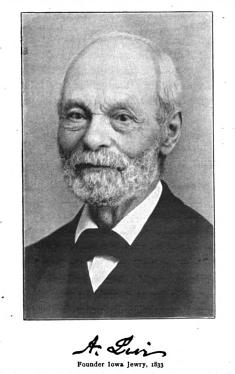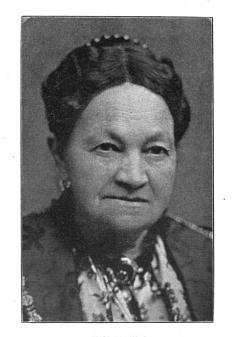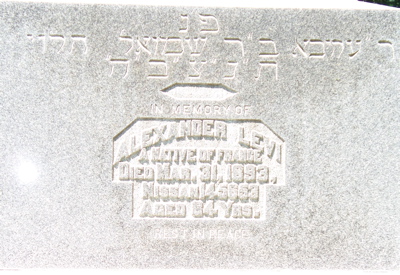Encyclopedia Dubuque
"Encyclopedia Dubuque is the online authority for all things Dubuque, written by the people who know the city best.”
Marshall Cohen—researcher and producer, CNN
Affiliated with the Local History Network of the State Historical Society of Iowa, and the Iowa Museum Association.
LEVI, Alexander: Difference between revisions
No edit summary |
No edit summary |
||
| Line 1: | Line 1: | ||
[[File:LeviA.jpg|right|thumb|150px|Alexander Levi.]]LEVI, Alexander. (France, Mar. 13, 1809--Dubuque, IA, Mar. 31, 1893). In 1837 Levi became the first immigrant to be naturalized in the State of Iowa while it was still part of Wisconsin Territory. He was also the first initiatory member of the Masonic Order in Dubuque. | [[File:LeviA.jpg|right|thumb|150px|Alexander Levi.]]LEVI, Alexander. (France, Mar. 13, 1809--Dubuque, IA, Mar. 31, 1893). In 1837 Levi became the first immigrant to be naturalized in the State of Iowa while it was still part of Wisconsin Territory. He was also the first initiatory member of the Masonic Order in Dubuque. (1) | ||
Levi moved to Dubuque on August 1, 1833, and began a variety of business ventures including the sale of groceries, dry goods, and clothing. Levi also believed in advertising as shown by the following placed in [[DUBUQUE VISITOR]], May 11, 1836, p. 3 | Levi moved to Dubuque on August 1, 1833, and began a variety of business ventures including the sale of groceries, dry goods, and clothing. Levi also believed in advertising as shown by the following placed in the [[DUBUQUE VISITOR]], May 11, 1836, p. 3 | ||
A. LEVI & CO. Would inform their friends and the | A. LEVI & CO. Would inform their friends and the | ||
| Line 11: | Line 11: | ||
box, Tar by the keg, First rate Bacon, Butter and Lard, | box, Tar by the keg, First rate Bacon, Butter and Lard, | ||
Corn and Oats, Porter and Cider, Wines of all kinds, | Corn and Oats, Porter and Cider, Wines of all kinds, | ||
Loaf Sugar, Soap by the box, pipes | Loaf Sugar, Soap by the box, pipes | ||
Levi also owned extensive [[MINING]] property and real estate along South Locust Street. He was | Levi also owned extensive [[MINING]] property and real estate along South Locust Street. He was president of the [[DUBUQUE GOLD MINING COMPANY]] which was incorporated in 1860 and justice of the from 1846 to 1848. (2) | ||
In 1856, faithful to his [[JEWISH COMMUNITY]], Levi organized B'nai Jeshrun, the Jewish congregation that met in a rented hall at Locust and 5th [[STREETS]]. Of the twenty acres he owned in Section 13 of Julien Township, Levi deeded .6 acre for Jewish burials. This land was later deeded to the City of Dubuque that conveyed the property to the [[LINWOOD CEMETERY]] Association. His home became St. Margaret's Hall of [[ST. JOSEPH'S ACADEMY]]. | In 1856, faithful to his [[JEWISH COMMUNITY]], Levi organized B'nai Jeshrun, the Jewish congregation that met in a rented hall at Locust and 5th [[STREETS]]. Of the twenty acres he owned in Section 13 of Julien Township, Levi deeded .6 acre for Jewish burials. This land was later deeded to the City of Dubuque that conveyed the property to the [[LINWOOD CEMETERY]] Association. His home became St. Margaret's Hall of [[ST. JOSEPH'S ACADEMY]]. | ||
[[File:Levi_Minette.jpg|right|thumb|150px|Minette Levi.]]Alexander Levi returned to France where he married Miss Minette Levi. One of their daughters married James Levi, a nephew. James Levi had worked for his uncle as a salesman for three years. When Alexander died, James and Alexander's son Eugene took over the family business in Dubuque which became [[JAMES LEVI AND COMPANY]]. | [[File:Levi_Minette.jpg|right|thumb|150px|Minette Levi.]]Alexander Levi returned to France where he married Miss Minette Levi. (3) One of their daughters married James Levi, a nephew. James Levi had worked for his uncle as a salesman for three years. When Alexander died, James and Alexander's son Eugene took over the family business in Dubuque which became [[JAMES LEVI AND COMPANY]]. | ||
[[Image:levi-5.jpg|left|thumb|250px|Inscription on cemetery marker]] | [[Image:levi-5.jpg|left|thumb|250px|Inscription on cemetery marker]] | ||
| Line 63: | Line 27: | ||
Source: | Source: | ||
1. Fleishaker, Oscar. '''The Illinois-Iowa Jewish Community on the Banks of the Mississippi''', Doctoral Degree Dissertation to the Faculty of the Harry Fischel School for Higher Jewish Studies, Graduate Division, Yeshiva University, 1957, p. 12 | 1. Oldt, Franklin T. '''History of Dubuque County, Iowa'''. Chicago: Western History Company, 1880, p. 838 | ||
2. Fleishaker, Oscar. '''The Illinois-Iowa Jewish Community on the Banks of the Mississippi''', Doctoral Degree Dissertation to the Faculty of the Harry Fischel School for Higher Jewish Studies, Graduate Division, Yeshiva University, 1957, p. 12 | |||
3. Oldt. | |||
"Naturalization of Dubuque Jew 100 Years Ago Hailed," Telegraph Herald Sept. 5, 1927 | "Naturalization of Dubuque Jew 100 Years Ago Hailed," ''Telegraph Herald'' Sept. 5, 1927 | ||
175 Years, Volume 3, Levi A Man of Entrepreneurial Vision," Telegraph Herald, September 15, 2008 | 175 Years, Volume 3, "Levi A Man of Entrepreneurial Vision," ''Telegraph Herald'', September 15, 2008 | ||
[[Category: Religious Leader]] | [[Category: Religious Leader]] | ||
Revision as of 22:42, 20 December 2015
LEVI, Alexander. (France, Mar. 13, 1809--Dubuque, IA, Mar. 31, 1893). In 1837 Levi became the first immigrant to be naturalized in the State of Iowa while it was still part of Wisconsin Territory. He was also the first initiatory member of the Masonic Order in Dubuque. (1)
Levi moved to Dubuque on August 1, 1833, and began a variety of business ventures including the sale of groceries, dry goods, and clothing. Levi also believed in advertising as shown by the following placed in the DUBUQUE VISITOR, May 11, 1836, p. 3
A. LEVI & CO. Would inform their friends and the
public generally, that they have on hand and will
at all times keep a large and fresh assortment of
Groceries and Provisions, viz. Mess and Prime Pork,
Fresh Flour, Corn Meal, Whiskey by the barrel, French
and Peach Brandy, Tobacco and Cigars, Candles by the
box, Tar by the keg, First rate Bacon, Butter and Lard,
Corn and Oats, Porter and Cider, Wines of all kinds,
Loaf Sugar, Soap by the box, pipes
Levi also owned extensive MINING property and real estate along South Locust Street. He was president of the DUBUQUE GOLD MINING COMPANY which was incorporated in 1860 and justice of the from 1846 to 1848. (2)
In 1856, faithful to his JEWISH COMMUNITY, Levi organized B'nai Jeshrun, the Jewish congregation that met in a rented hall at Locust and 5th STREETS. Of the twenty acres he owned in Section 13 of Julien Township, Levi deeded .6 acre for Jewish burials. This land was later deeded to the City of Dubuque that conveyed the property to the LINWOOD CEMETERY Association. His home became St. Margaret's Hall of ST. JOSEPH'S ACADEMY.
Alexander Levi returned to France where he married Miss Minette Levi. (3) One of their daughters married James Levi, a nephew. James Levi had worked for his uncle as a salesman for three years. When Alexander died, James and Alexander's son Eugene took over the family business in Dubuque which became JAMES LEVI AND COMPANY.
See: A. LEVI
--
Source:
1. Oldt, Franklin T. History of Dubuque County, Iowa. Chicago: Western History Company, 1880, p. 838
2. Fleishaker, Oscar. The Illinois-Iowa Jewish Community on the Banks of the Mississippi, Doctoral Degree Dissertation to the Faculty of the Harry Fischel School for Higher Jewish Studies, Graduate Division, Yeshiva University, 1957, p. 12
3. Oldt.
"Naturalization of Dubuque Jew 100 Years Ago Hailed," Telegraph Herald Sept. 5, 1927
175 Years, Volume 3, "Levi A Man of Entrepreneurial Vision," Telegraph Herald, September 15, 2008




